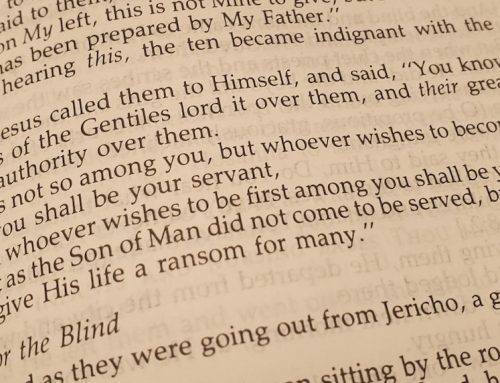The charge of murmuring is an easy weapon in the hands of Stanton teachers and preachers to strike fear into the hearts of the flock should they get the crazy notion of disagreeing with them. The cleverness of the charge is its easy adaptation to any situation. Nearly any disagreement can be twisted into an accusation of so-called “murmuring,” complete with vivid imagery of Korah leading his insurrection against Moses.
“We must keep the church pure,” they say. Indeed. Pure of reasoned discussion and honest inquiry. Pure of anyone who dares seek truth more than the approval of men.
“[E]very Christian has a right and a responsibility to express as well as to teach those things which they honestly believe to be scriptural without being called a false teacher, or one who perverts the word of God. Inasmuch as the church is so divided upon so many things, and cannot come into an agreement upon hardly anything, it ill behooves a preacher to denounce and call names because he happens to disagree with that which is taught by others.”
Acts 6:1 – And in those days, when the number of the disciples was multiplied, there arose a murmuring of the Grecians against the Hebrews, because their widows were neglected in the daily ministration.
I would like to ask the Bible scholars at Stanton what the church did in response to this “murmuring” of the Grecians against the Hebrews? Did they “withdraw” from the offenders? Did they publicly rebuke them for impugning the twelve apostles? They were the ones leading the flock, after all. No, here is what they did. They listened to them. That’s right. The leadership listened to the “murmurers” and made significant changes.
Acts 6:2-6 Then the twelve called the multitude of the disciples unto them, and said, It is not reason that we should leave the word of God, and serve tables. 3 Wherefore, brethren, look ye out among you seven men of honest report, full of the Holy Ghost and wisdom, whom we may appoint over this business. 4 But we will give ourselves continually to prayer, and to the ministry of the word. 5 And the saying pleased the whole multitude: and they chose Stephen, a man full of faith and of the Holy Ghost, and Philip, and Prochorus, and Nicanor, and Timon, and Parmenas, and Nicolas a proselyte of Antioch: 6 Whom they set before the apostles: and when they had prayed, they laid their hands on them.
The Greek christians were complaining (murmuring), legitimately, that their widows were being neglected in daily ministry in favor of the Hebrew widows. The response was not to call a meeting and punish the Greek whistleblowers. It was to call a meeting and create a more organized division of duties. The church appointed deacons (servants) to take care of matters like this so the apostles didn’t have to. They fixed the problem that was being complained about because it was a legitimate complaint!
This is a far cry from today’s crop of teachers and preachers who ignore the legitimacy of any dissenting views and simply lord their power over the flock. They squash dissent with a heavy hand using trumped-up charges of murmuring.
But just as one person’s May Week is another person’s Baptist Convention, one person’s murmuring, it seems, is another person’s whistleblowing. To one, it’s a tool of reform. To the other, it’s a tool of fear and intimidation to keep people in line. This, my brothers, ought not to be.






Thank you Kevin, this needs to be shouted from the rooftops! I pray the current leadership and membership is paying attention.
One sentence of disagreement, ONE sentence spoken ONE time can completely change everything for a Christian and their family; and in many cases the dissent was LEGITIMATE which the Church will (sometimes) admit but will NOT lift the withdrawal. I believe this oppressive tactic is the KEY to the ability of the leadership/dictatorship to hold on to their power, the reason the church takes so PAINFULLY long to correct it's errors and why members sit under oppressive teachers for DECADES. Members choose to sit in silent disagreement for YEARS rather than risk withdrawal hoping one of the 'higher-ups' will 'see… Read more »
In what my congregation was doing, it was really hard not to get withdrawn from and still let them know what they were doing was not right. Eventually I was ostracized. There were a lot of classes and sermons telling the congregation that I would not accept teaching, but interesting enough that never gave specifics of what I was not accepting. In my mind and understanding I knew that I would have to answer to God if I knew the truth and didn't follow it. They didn't like it when I wouldn't follow them. I have always wondered what would… Read more »
Great comment, Been There!!! Thank you! So very true. No one is ever allowed to disagree with a teacher or evangelist, if they value their membership in the church. Not sure why anyone studies their Bible, because if you happen to find anything in it that is different from your teachers assessment, you are going to be in hot water! That's not a bad thing, because just like tea bags, you find out a humans true flavor when they get in hot water. LOL. " I look back on this and agree that it is better to stand right in… Read more »
'I would rather have questions that can't be answered than answers that can't be questioned.'
Excellent quote!
When I saw the problem of the members not being there for brethren with infirmities and would bring it to their attention I was threatened with withdrawl if I didn't quit bringing it up. The church's definition of helping out those with infirmities that had trouble making it to some classes was to continually berate them by telling them they need to "push the flesh" or the are in sin, yet would not take the time to spend time with them by coming over to their house with the scriptures of missed classes or sermons. If anything was said contrary… Read more »
Totally agree, Kevin, this is a truly great post. Very timely too!! Merie's quote is so true. I was kicked out of the church for doing exactly what she did. "[E]very Christian has a right and a responsibility to express as well as to teach those things which they honestly believe to be scriptural without being called a false teacher, or one who perverts the word of God. Inasmuch as the church is so divided upon so many things, and cannot come into an agreement upon hardly anything, it ill behooves a preacher to denounce and call names because he… Read more »
Well said been there. Great article Kevin.